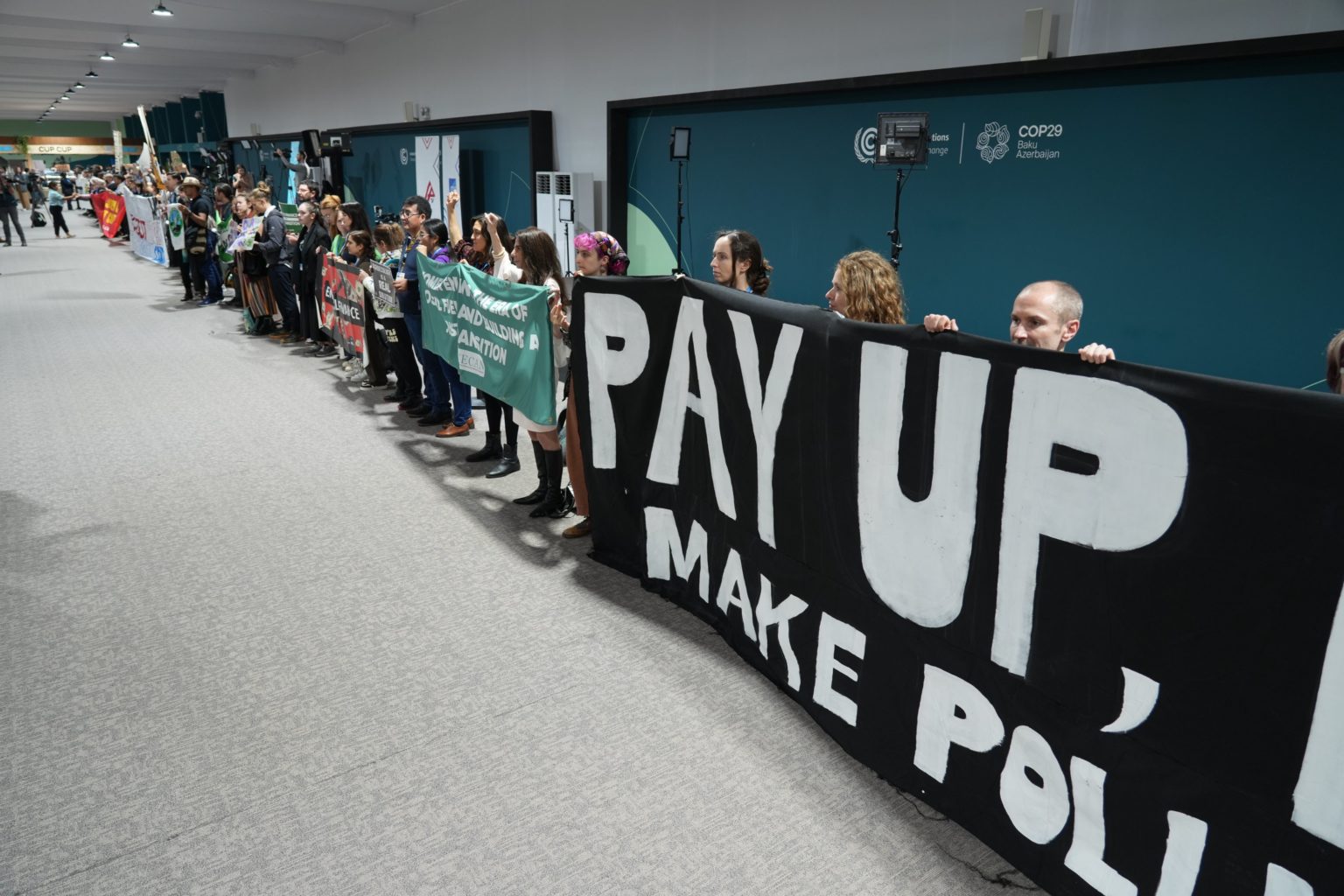By Adeyemi Adekunle
Tensions ran high on the final day of the COP29 climate summit as negotiators from nearly 200 nations grappled with a contentious $250 billion annual offer from wealthy nations, aimed at bolstering climate action in developing countries by 2035.
Despite intense discussions that stretched throughout the night, the proposal received a flat rejection from delegates representing the most vulnerable nations, who deemed it inadequate in the face of escalating climate threats.
As dawn broke over the Caspian Sea city of Baku, negotiators emerged from an exhausting night filled with passionate debate, only to face the harsh reality that a consensus remained elusive.
The summit’s host, Azerbaijan, had hoped to finalize a global climate deal by 10:00 AM local time, but the absence of agreement among delegations reflected deep-seated frustrations surrounding the wealthier nations’ commitment to portions of the global climate financing framework.
At the heart of the impasse was an offer to increase climate aid to developing nations from the previous pledge of $100 billion to $250 billion annually by 2035.
While wealthy countries touted this increment as a sign of progress, representatives from small island nations and other vulnerable states rose in unison to critique the proposal, asserting it was a mere token gesture amid their desperate need for far greater financial support to combat immediate threats like rising sea levels and severe droughts.
“It is shameful to have such derisory figures put forward,” stated Tina Stege, the climate envoy for the Marshall Islands, a nation grappling with existential challenges posed by climate change.
Her sentiments echoed throughout the room as representatives from the Alliance of Small Island States declared the offer to be a crude mockery of their plight, voicing concerns that it reflected a “contempt for our vulnerable people.”
Among the developing nations, a coalition called for funding at least double the amount suggested, with demands reaching upward of $500 billion annually.
Delegates pointed out that, in real terms, the proposed $250 billion fell even shorter when factoring in rising inflation and the urgent need for immediate funding to mitigate climate-related disasters affecting their communities.
Responses from developed nations added to the discontent. A senior U.S. official indicated that the existing figure should be seen as a significant achievement, suggesting that higher commitments would require “even more ambition” from all parties involved. Many activists and negotiators voiced their disdain for this stance, voicing concerns that political will seemed to dwindle as summit talks advanced.
The malaise in negotiations drew criticism from European leaders, particularly Germany, which has long prided itself on spearheading climate initiatives.
German Foreign Minister Annalena Baerbock emphasized that while Europe sought to fulfill its commitments, it could not shoulder the burden alone. She suggested that innovative financial solutions like debt restructuring were crucial to achieving the lofty targets set before them.
Central to the negotiations is an ambitious global target of raising at least $1.3 trillion annually by 2035, not just from developed nations but also mobilizing capital from the private sector.
Yet, for many in the room, this goal seemed increasingly out of reach, leading to fraught conversations about equity and fairness in sharing global responsibilities.
Obed Koringo, a passionate Kenyan climate activist from CARE, expressed mounting frustration over the slow pacing of discussions. “$250 billion is a joke,” he remarked firmly. “From Africa, what we are saying is that no deal is better than a bad deal.” His statement encapsulated the sentiments of many delegates who felt marginalized and unheard during pivotal negotiations that would determine their futures.
Amid these complex dynamics, the calls for stronger climate commitments did not wane. Emerging economies like China—often classified as developing nations under the UN framework—were urged to contribute to the funding pool, despite their traditional reluctance to take on formal responsibilities. Acknowledging its climate assistance efforts, China maintained its position prioritizing voluntary aid over obligatory contributions.
Spearheading a call for unity amidst division, Azerbaijan’s officials urged negotiating parties to push forward, while recognizing the need for fair and equitable financial frameworks. Yet the aspiration for a consensus remained clouded by differing priorities and the inherent complexities of international climate agreements.
An essential element of ongoing negotiations was clarifying the global agreement’s language regarding a shift away from fossil fuels. However, discussions grew increasingly contentious after a Saudi official representing the Arab Group stated vehemently that they would not accept clauses targeting specific energy sectors. This statement drew a sharp rebuttal from Baerbock, who cautioned that such resistance hinders collective progress and risks “turning back the clock.”
As the event neared its closing session, feedback from the ground revealed that many believed a meaningful climate pact was within reach but would likely leave “a bad taste in everyone’s mouth,” as expressed by Avinash Persaud, the special advisor on climate change to the president of the Inter-American Development Bank.
With the summit’s coming to an end, participant nations faced an immediate dilemma: reach an agreement that all could accept, even if it fell short of their aspirations, or risk leaving Baku without any tangible commitments. The stakes were ever higher as climate chaos continued to unfold globally, with the echoes of Baku poised to resonate in future negotiations where survival eclipses political posturing.
This latest round of climate talks exemplified a broader struggle over responsibility, equity, and the urgency required to act decisively against the worsening climate crisis.
For many nations—especially those most impacted by climate change—the urgency for substantial financial commitments is not merely a policy issue; it is a matter of survival.




